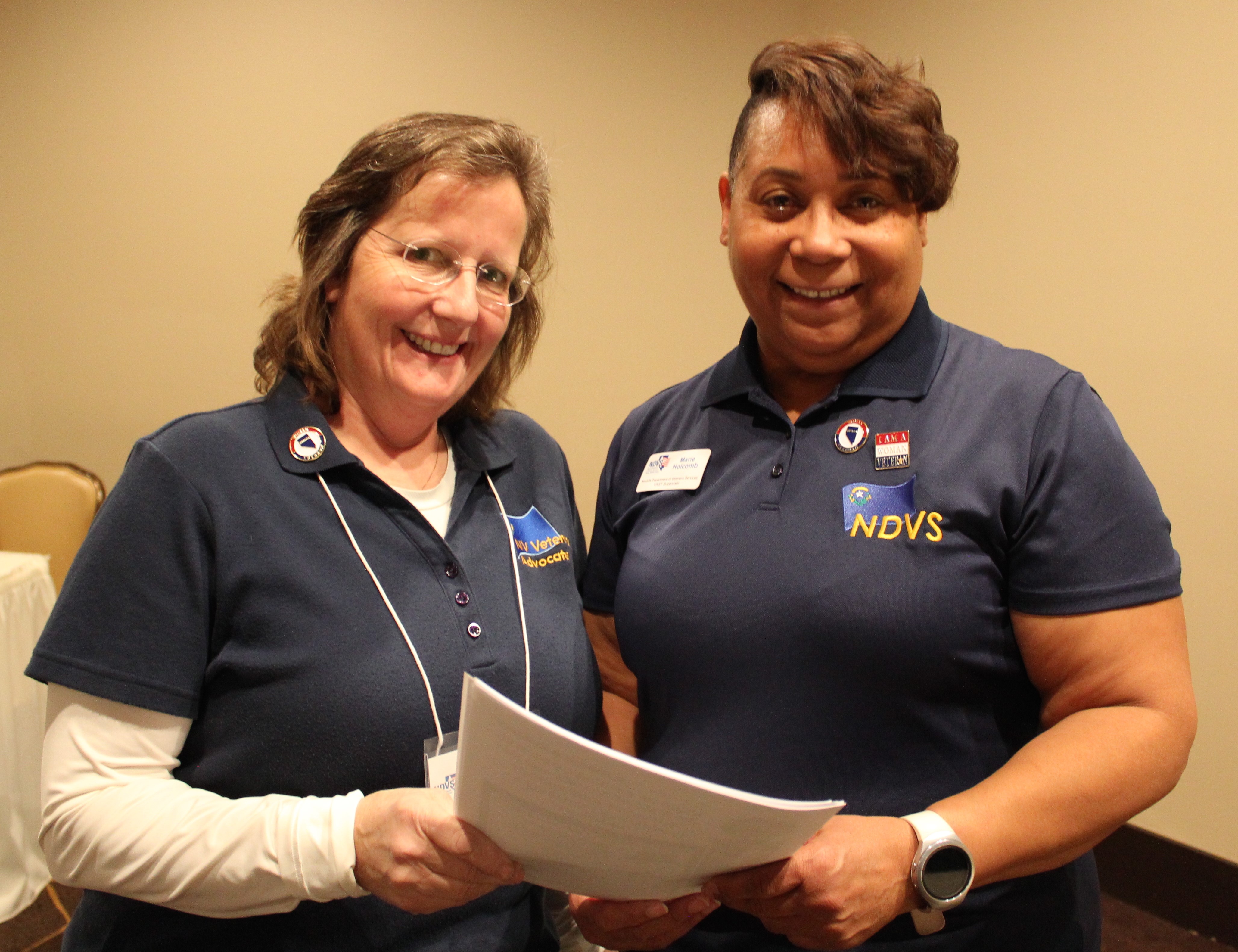- Home
- About
- Benefits & Services
- State Veterans Homes
- Nevada Veterans Memorial Cemeteries
- Community
- News
- Suicide Prevention
- Opioid Prevention
- Donate
- Fallen Heroes
- Nevada’s Veterans Memorials
- Calendar/Events
- Nevada Transition Assistance Program (NVTAP)

By Chuck N. Baker (Photo: Rollins on left seen with VSO Marie Holcomb)
(Panaca) — There are many ways to help veterans who require assistance filing claims, requesting government discounts and seeking medical examinations. One way is to become a volunteer through the Nevada Veterans Advocate (NVA) program.
Many NVAs are veterans, but it is not a requirement. What is required is the ability to lend a sympathetic ear, help, assist, advise and relate to veterans and their families. One NVA who fits this bill is Linda S. Rollins. Rollins is uniquely qualified to assist others and is one of only three NVAs in rural Lincoln County.
“People come to Lincoln County for specific reasons,” Rollins said. “There are no stop lights, no police car sirens, no noise. It’s very secluded.” However, that doesn’t mean the community doesn’t have veterans in need of assistance. Rollins is in a unique situation to help NDVS provide assistance to this community and the surrounding area.
Rollins is an Air Force veteran who wanted to become a pararescue airman. That specialty involved serving under Air Combat Command, tasked with recovery and medical treatment of personnel in humanitarian and combat environments. But she explains she was told, “Because I was a woman, I could not do that.” The year was 1980. Instead of getting the job she wanted, she was given a list of military operational specialties with 15 minutes to decide which one to choose. She chose to work in maintenance of electronic communications involving “the secure communications from base to base.”
All communications were encrypted, and she maintained the equipment that handled that. “We learned to troubleshoot transistors, diodes, resistors, capacitors and transformers, down to the components. We didn’t replace the mother boards like they do nowadays. Back then, we were trained to find the actual cause of the problem and fix it.”
Fast forward to today, after leaving the Air Force, going through a marriage, divorce and remarriage to a man who brought her to Nevada’s Lincoln County, Rollins became involved with Post 40 of the American Legion and the Women Veterans of Nevada.
In March of 2013, she graduated with a Bachelor of Science degree in Nursing and Registered Nurse certification. She credits the Women Veterans of Nevada for introducing her to the greater veterans’ community and for the encouragement to continue her involvement with veterans.
Rollins became an NVA in 2016. Today, she and two others – Mary Brose (spouse of a deceased Navy veteran) and Owen Hill (Army veteran) – work with Lincoln County veterans. “The county has an eight percent population of veterans,” she said, adding, “It may be a rural area, but almost every day I run into veterans here.”
Rollins works out of a rent-free office at the senior center in Panaca, an unincorporated town on State Route 319, about two miles east of U.S. Route 93, near the Utah border. She explains it is 179 miles from Panaca to Las Vegas or a three-hour, 35-minute drive, nonstop. Having NVAs in town saves veterans from having to travel to Las Vegas to access a Veteran Service Officer. Rollins utilizes video-teleconferencing to put her clients in touch with VSO Doug Bunner, who is stationed at the VA in North Las Vegas.
Veterans can visit her every 2nd and 4th Wednesday of the month. No appointments are necessary.
The NVA program consists of 20 educational modules that provide non-technical answers to common questions that many veterans have concerning VA benefits, medical assistance, the G.I. Bill, survivor benefits and related topics. After participants graduate from the course, they receive a certificate and can join the NDVS team by participating in outreach events to connect with veterans and their families. For more information about the NVA program, or to take the online course, go to https://nvapps.state.nv.us